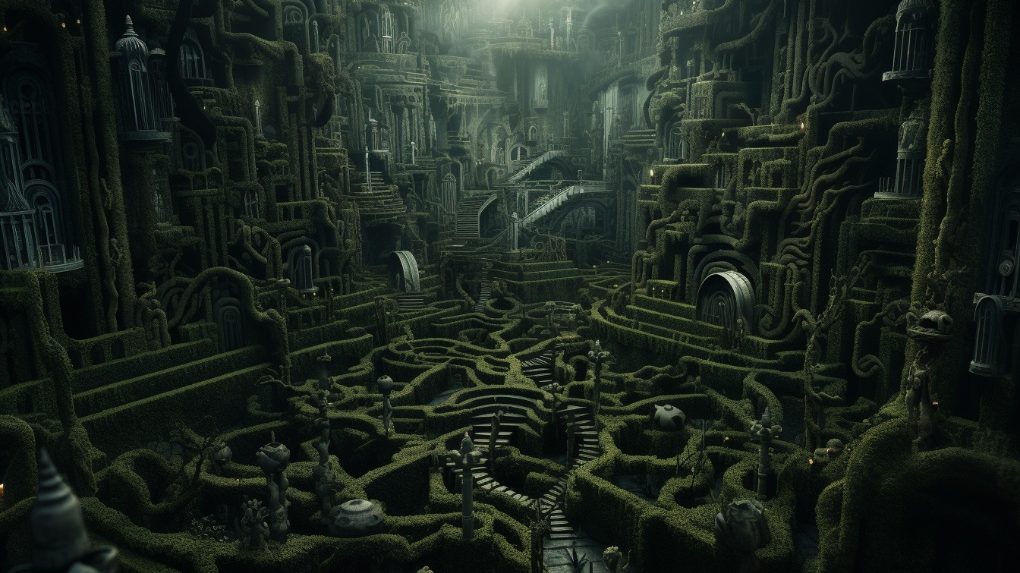In the vast tapestry of spiritual beliefs, few concepts have captured the collective imagination as profoundly as karma. At its most basic, karma refers to the principle that every act, word, and thought, whether good or bad, affects a person’s future.
It’s the universe’s way of ensuring balance, like a cosmic cause and effect. But here’s where it gets complicated: the consequences aren’t always immediate. They might not even manifest in the same life, leading us into the realm of past lives and reincarnation.
The Karmic Cycle and Its Importance
The karmic cycle, in essence, is the continuous loop of cause and effect throughout our lives and even subsequent ones. It’s believed that we’re bound to this cycle until we achieve a certain state of spiritual enlightenment or liberation. Every act, intention, and emotion plays a part in determining the course of this cycle. So, when we talk about being stuck in a bad karma loop, it means that negative actions or intentions from the past are affecting the present, and possibly the future.
Digging Deeper: Buddhist Philosophy and Karma
Buddhist Philosophy on the Nature of Karma
Buddhist philosophy offers a nuanced understanding of karma. According to Buddhism, karma is neither a punishment nor a reward system handed down by a higher power. Instead, it’s the natural result of our actions, determined by the intent behind them. When we act out of greed, anger, or ignorance, we sow the seeds of unhappiness. Conversely, actions rooted in compassion, love, and knowledge lead to happiness. It’s a principle deeply ingrained in the nature of reality itself.
The Interplay Between Karma and Reincarnation in Buddhism
Buddhism and Hinduism both emphasize the concept of reincarnation. While the two have their differences, the common thread is the belief that the soul, or spirit, is reborn into new lives. Our karma, accumulated over multiple lifetimes, affects the circumstances of each new birth. For example, consistent good deeds in one life could lead to a fortunate rebirth, while unresolved bad karma might lead to a more challenging existence.
You may also like Good Karma Meaning – How to Attract Positivity
The Role of Past Lives in Determining Current Karma
Past Lives and Their Link to Our Present
It’s a huge leap for many to believe that our past lives can influence our current circumstances. Yet, the idea is that unresolved issues or karmic debts from previous lives come forward into our present, affecting relationships, health, and even our emotional well-being. Think of it like an old unpaid bill suddenly reappearing when you least expect it. The universe doesn’t forget, and the karmic cycle ensures everything is balanced out, no matter how many lives it takes.
Karmic Debts from Previous Lives
So, what exactly is a karmic debt? It’s a kind of energetic IOU. If, for instance, you caused harm to someone in a past life, that energy might return to you as suffering or challenges in this life. The relationship between past actions and current circumstances isn’t always direct or obvious, but the principle of karma suggests that everything is interconnected in the vast web of existence.
Good Karma vs. Bad Karma: The Eternal Tug of War
Defining Good and Bad Karma: A Measure of Intent
When we talk about good and bad karma, it’s essential to clarify that these are not judgments in the moralistic sense. Instead, they are outcomes determined by intent. Good karma flows from actions rooted in compassion, love, and selflessness. It’s when you drop a coin in a homeless person’s cup or stay up late to help a friend in need. On the other hand, bad karma stems from actions driven by selfishness, greed, or malice. It’s like the universe’s way of saying, “Hey, you need to check yourself.”
But it’s not all about grand gestures. Simple acts like speaking truthfully, managing one’s negative emotions, or even the intention behind words can shape our karmic destiny.
How Our Actions, Intentions, and Emotions Affect Our Karmic Balance
At its core, karma is all about energy. Every emotion, intention, and act emits a specific kind of energy into the universe, which, in turn, affects our personal karmic balance. So, even if an action seems insignificant like failing to hold the door for someone or letting harmful words slip in a moment of anger, it can have repercussions. It’s like ripples in a pond; even the tiniest drop can create waves. This also underscores the importance of self-awareness and mindfulness in our day-to-day lives.
The Science and Psychology Behind the Belief of Karma
Interestingly, while karma is deeply rooted in spiritual traditions, aspects of it resonate with modern psychology. The idea that our actions have consequences and that positive behaviors lead to positive outcomes aligns with behavioral science. Universities and researchers have explored the psychological effects of beliefs in karma, finding that those who believe in the concept are often more ethical, compassionate, and socially conscious. It’s a blend of spirituality and science, showing that our belief systems, no matter their origin, play a pivotal role in shaping our behavior.
Also read The Best Movies About Reincarnation Exploring Different Cultures and Beliefs
The Real-world Impact of Karma: From Happiness to Suffering
Karma in Action: Real Life Examples
We’ve all heard stories that seem to showcase karma in action. A deceitful person eventually facing the consequences of their deception, or someone who consistently spreads kindness finding happiness in unexpected places. While it’s challenging to definitively attribute these outcomes to karma, they serve as powerful examples of the universe’s balancing act.
Take, for instance, a businessman from Canada who, after years of prioritizing profit over people, found himself facing financial ruin. In his moments of reflection, he realized his past actions and intent had a role to play in his downfall. Conversely, there’s the tale of a woman who devoted her life to community service and, despite facing personal challenges, always found support and love when she needed it the most.
Why Some People Seem to Reap More Negative Consequences
It’s a question many ponder: why do some people seem to face a constant stream of challenges, while others sail smoothly? According to the principle of karma, past lives and accumulated actions over time play a significant role. However, it’s also essential to understand that everyone’s karmic journey is unique. Just because someone is facing hardships doesn’t necessarily mean they’ve accrued vast amounts of bad karma. Life, with all its complexities, cannot be boiled down to a simple ledger of good and bad.
Karma Across the Globe: From Canada to Hinduism
While many associate karma with eastern religions like Buddhism and Hinduism, its essence is understood and appreciated worldwide. In Canada, for instance, the concept resonates with the idea that “what goes around comes around.” Different cultures might have varied interpretations, but the underlying principle remains consistent: our actions have consequences, and the energy we put out into the world eventually comes back to us.
Navigating the Karmic Cycle: How to Break Free and Realize True Liberation
The Power and Possibility of Changing One’s Karma
The idea of being trapped in a karmic cycle, especially if one believes they’re experiencing the brunt of bad karma, can feel daunting. But here’s the beautiful truth about the universe: it’s dynamic, not static. Just as we have the power to create karmic debt, we also have the potential to clear it.
Every moment presents a fresh opportunity to shape our karmic journey. By practicing mindfulness, compassion, and self-reflection, we can start to realize where we might be going astray and course-correct. The power to change one’s karma lies within the choices we make each day. Whether it’s a decision to address past wrongs, apologize sincerely, or act with genuine kindness, every positive action contributes to shifting the karmic balance.
The Relationship Between Karma and Personal Responsibility
One of the profound teachings of karma is the emphasis on personal responsibility. It’s a reminder that we are the captains of our ship, and the course we set determines the waters we navigate. By acknowledging the consequences of our actions, not just in the material world but on a cosmic scale, we can foster a deeper sense of responsibility towards ourselves and others.
For instance, if we harm another, whether physically or emotionally, it isn’t just a matter of interpersonal consequences. That harm reverberates in the universe, and at some point, the scales must be balanced. Recognizing this interconnectedness can inspire us to act with more care, empathy, and wisdom.
Seeking Liberation: The Ultimate Goal of Managing One’s Karma
While the idea of karma often revolves around the actions and consequences of individual lives, the broader goal, especially in spiritual traditions like Buddhism and Hinduism, is achieving liberation or moksha. This is the state where the soul is free from the endless cycle of birth, death, and rebirth, having resolved all karmic debts.
Liberation is attained when we not only manage our karma but transcend it. It’s about realizing the impermanent nature of reality, detaching from worldly desires, and attaining a state of pure consciousness and bliss. This doesn’t mean one must renounce the world and retreat to a mountaintop. Instead, it’s about finding balance, understanding the transient nature of happiness and suffering, and moving through life with grace, awareness, and intention.
Related: How Past Life Regression Can Help You Find Your Soulmate
Delving into Karma’s Nuances: Beyond Just Good and Bad
The Complexity of Intent: Desire, Action, and Control
While we’ve explored how intent underpins karma, it’s also crucial to consider the role of desire. Often, our actions are driven by deep-seated desires, which might not always align with our conscious intentions. For instance, one might act out of a desire for rewards, even if on the surface they appear altruistic. Here, the karmic consequence won’t merely evaluate the act, but the underlying desire propelling it.
Moreover, what happens when we fail to act, even if our intentions were noble? Failing to act can sometimes be as consequential as acting with ill intent, especially if our inaction leads to harm or suffering. The intricate web of karma examines both our actions and inactions in tandem with our deepest desires.
The Ephemeral Nature of Karma: Rewards, Punishments, and Impermanence
Karmic rewards and punishments are not eternal verdicts but rather fleeting reactions to our choices. Think of the sweet taste of honey – it’s a brief reward for the hard work of bees. Similarly, the discomfort of a sick day might be an ephemeral punishment for overworking without enough sleep. The universe doesn’t linger on these consequences; they appear and disappear, just as our actions come and go.
University Studies and the Societal Perception of Karma
Recent university research delves into societal perceptions of karma. These studies reveal that people often see karma as a force of control in an unpredictable world. For many, it offers solace, a belief that there’s some cosmic order ensuring justice. However, it’s essential to remember that this is a human-centric definition. Karma, in its purest definition, remains neutral, merely reflecting the energies we emit.
Personal Responsibility and The Act of Letting Go
Being responsible for one’s actions is paramount in understanding karma. But what happens when circumstances are beyond our control? What if external factors lead us down a path we never intended? Here’s where the practice of letting go becomes vital. It’s recognizing that while we are responsible for our actions, we are also bound to the vast interconnectedness of the universe. Sometimes, we may be unable to foresee the consequences of our actions or how others might be affected. Accepting this uncertainty is as crucial as understanding our role in the karmic cycle.
Redirecting Karma’s Course: The Role of Proactive Practice
Understanding karma is one thing, but how does one redirect its course when faced with negative spirals? This is where practice comes into play. Engaging in consistent positive actions, meditation, and self-reflection can gradually shift the karmic balance. It’s akin to a boat slowly adjusting its course in the vast ocean of existence.
In Conclusion
Throughout this exploration into the enigmatic realm of bad karma, one clear message surfaces: our choices, intentions, and actions possess the power to shape our future, for better or worse. Grounded in spiritual foundations and resonating across continents, from ancient philosophies to modern-day anecdotes in places like Canada, the concept of bad karma serves as a cosmic reminder of the repercussions of our deeds.
While the mysteries of past lives, karmic debts, and reincarnation weave a complex narrative, at the heart lies a simple truth: negative intentions and actions, no matter how minute, have lasting effects. These effects might not always be immediate and may even span lifetimes, challenging us unexpectedly. However, recognizing and understanding these karmic consequences offer pathways to personal growth, transformation, and, ultimately, liberation.
In grappling with the shadows of bad karma, we are also presented with the hope and possibility of change. Every moment provides an opportunity for redemption, reflection, and positive action. As we journey through life’s intricate tapestry, let’s remember the weight of our choices and strive to sow seeds of goodness, ensuring a brighter and more harmonious future.



